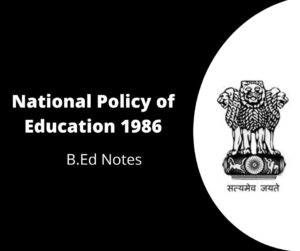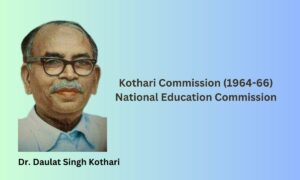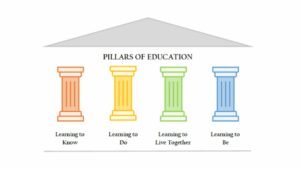The Secondary Education Commission is also known as the Mudaliar Commission. The commission was appointed on 23rd September 1952 and was one of the most important events that have taken place in the field of the Indian education system.
The commission was appointed under the chairmanship of Dr. Lakshman Swami Mudaliar and A.N Basu Chancellor and Vice-Chancellor of Madras University and the principal of the central institute of Education, Delhi acted as member Secretary of the commission.
Aims and Terms of Reference of Secondary Education Commission
To enquire into and report on the present position of secondary education in India, in all its aspects.
- To Suggest measures for its re-organization and improvement with particular reference to
- The aim, organization, and content of secondary education
- Its relationship to primary task and higher educationInter-relationship of the secondary school of different types and
- Other allied problems so that a sound and reasonable uniform system of secondary education suited to our needs and resources may be provided for the whole country
Analysis of Problems
- The commission analyzed the various problems facing the secondary education commission and suggested suitable remedies for them
- It diagnosed the main defects of the prevention system of secondary education
- To remedy these deep-rooted defects, the commission suggested a radical re-oriented and re-modelling of the existing system
Major Recommendation of the Secondary Education Commission
The major recommendation of the Secondary education commission or Mudaliar Commission (1952-53) are-
1. To produce ideal citizens
The commission has realized that no nation can progress without national feelings along with social feelings. Therefore, it has been laid down that the purpose of education should be to produce ideal citizens who inspire by strong national and social feelings are prepared to shoulder their responsibilities and duties, and can easily offer any sacrifice for the sake of the nation. Such citizens should have co-operated feelings directed toward universal brotherhood, which describes the national spirit.
2. To develop the capacity for Earning Money
The commission is of the view that after having received secondary education one should able to earn enough money for maintaining himself, for the developing this capacity vocational subjects should be introduced into the curriculum
3. Quality of Leadership
Secondary education should develop the quality of leadership in students. This quality is very necessary for the sake of democracy and for the development of the country as a whole.
4. To develop Human Virtues
Man is a social animal so he should have the spirit of cooperation, discipline, humility, love, kindness, and the feelings of brotherhood. The curriculum should be developed to have such subjects which may inculcate these virtues in students.
5. Duration of Secondary education
Recommended that secondary-level education should be for children between 11 to 17 years of age. It has divided this seven years of education into two parts (i) Junior High School stage for 3 years and (ii) High School for 4 years
6. Secondary Education reforms and changes
The commission has suggested the following changes in the secondary school curriculum
- To open Multi-purpose schools according to the varying interest and needs of students.
- The multi-purpose school should be open near the industrial institute. The students of these two types of institutions should learn from each other.
- Agriculture should be made a compulsory subject for the school in the village.
- In big cities, Technical areas should be established on the demand of the local public
- Home science should be made compulsory for girls and another subject should be common for both boys and girls.
7. Medium of instruction
The Mother tongue or the state language should be made the medium of instruction in this connection the commission expresses the following ideas-
- The students should be taught at least two languages at the junior high school stage
- The commission has also suggested that at the secondary stage, students should learn at least three languages the national language, the mother tongue or the regional language, and the foreign language
8. Curriculum of Secondary Education
The commission has emphasized the necessity of re-organizing the secondary school curriculum in order that the aims of education may be realized. In this connection, the commission wants that:
- The curriculum should be recognized according to the interest of the students.
- It should be determined for meeting the social aspirations
- It should ve re-organized keeping in view the demands of the times and those of the countries.
- It should be organized in such a way that the student’s time and leisure may not be wasted.
The Subject of Lower Secondary Education
In lower secondary education subjects should be mathematics, general science, language, social studies, physical education, art, handicraft, and music
Subjects for secondary education
In secondary education, subjects should be Humanities, Science, Agriculture, Fine arts, Industrial Subjects, Commercial subjects, and Home Science.
9. Selection of textbook
The Mudaliar Commission recommended that the textbook should be selected on the basis of its merits and utility. For this purpose, the commission has recommended the appointment of a High power committee that will select books for all the classes.
The standard of production, printing, and paper used and pictures and illustrations incorporated and suitable content will be the basis of selection.
In the opinion of the commission, the following person will constitute the High power committee for the selection of textbooks:-
- A high court judge
- A principal of some government educational institute
- A member of the public service commission
- A vice chancellor of a university
- Two eminent educationalists and the Director of Education of the state
- The commission further suggested that the textbook was once chosen should not be changed soon
10. Character formation
Character formation is an important aim of secondary education. This is useful not only for the individual but also for the nation. Therefore, raising the character of the nation, the character of the students should be well-formed.
11. Health Education
All the students should be medically examined at least twice a year. They should be given the knowledge of basic Hygiene, Cleanliness, and other health-related knowledge.
12. Method of Teaching
The teaching in secondary and higher secondary education emphasis should be shifted from verbalism and memorization to learning through purposeful, concrete, realistic situations and for this purpose, the principle of activity method and project method should be used in school.
The methods should provide opportunities for students to learn actively and apply mechanically the knowledge acquired in the classroom.
13. Examination System
The commission has made the following recommendation;-
- The number of external examinations should be reduced by introducing objective tests.
- School records should be maintained indicating the progress of each pupil from time to time.
Implementations of Recommendation of Secondary Education Commission (1952-53)
The secondary education commission has lots of improvements under the new education policy. Present day context of the secondary education commission is-
- Conversion of high school into higher secondary school or senior secondary school
- Developed Multipurpose school with the provision of a number of the elective subject along with an addition to the academic course
- Expansion and improvement of the facilities for teaching science
- Provision of educational and vocational guidance
- Improvement of the examination and evaluation system.
- Enlargement of facilities for vocational education.
- Quality of education is improved
Merits of Secondary Education Commission
- The Commission underlined the need for providing educational and vocational guidance to students
- The commission fully realized the need for providing a dynamic and progressive method of education
- The commission concept of the curriculum including subject, experiment, and co-curricular activities is quite modern
- Improving the system of examination was very valuable. No objective types of tests have become an integral part of the evaluation
- Activity-based education
- Stress on Agricultural Education
- Discussion of the aim of secondary education
- Child-Centered Education
- Improvement of teacher salary and position
- Co-curricular activities
- Stress on multipurpose school
De-Merits of Secondary Education Commission
- The commission recommendation was not implemented faithfully
- The various recommendations could not be implemented due to lack of funds and since the government’s approach to implementing the theme were without adequate fund.
- No New statement regarding the improvement of the social and economic condition of teacher
- No suggestion regarding women’s education
- Still stressed about the English
Conclusion
The Secondary Education Commission (1952-53) was a great landmark in the history of the Indian Education System. The Commission was appointed to examine secondary education in India and suggest measures to improve it. The commission was headed by Dr. Lakshmanaswamy Mudaliar submitted its report in 1953. The reports made several recommendations for the improvement of secondary education in India, including the introduction of a common school system, the establishment of new schools, teacher training, and the promotion of scientific and technical education. The recommendation of the Secondary education commission had a profound impact on the Education System of India and continues to shape it to this day. In conclusion, the secondary education commission plays a crucial role in shaping the future of education in India and remains the benchmark for National education policy to this day.
Frequently Asked Questions (FAQs)
Who headed the Secondary Education Commission of 1952-53
The Secondary education commission was headed by Dr. Lakshmanaswamy Mudaliar
What was the main objective of the Secondary Education Commission?
The main objective of the commission was to measure secondary education in India and suggest measures to improve it
When was the report of the Secondary Education Commission submitted?
The report on the Secondary education commission was submitted in 1953 by Dr. Lakshmanaswamy Mudaliar
How did the Secondary Education Commission emphasize the importance of education?
The Secondary Education Commission emphasized the importance of education as a means of national development and social progress.
What was the impact of the Secondary Education Commission on the Indian education system?
The recommendations of the Secondary Education Commission had a profound impact on the Indian education system and continue to shape it to this day.



